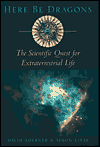Here Be Dragons: The Scientific Quest for Extraterrestrial Life
David W. Koerner, Simon LeVay
 In Here Be Dragons, astronomer David Koerner and neurobiologist Simon LeVay offer a scientifically compelling and colorful account of the search for life beyond Earth." "The authors survey the work of biologists, cosmologists, computer theorists, NASA engineers, SETI researchers, roboticists, and UFO enthusiasts and debunkers as they attempt to answer the greatest remaining question facing humankind: Are we alone? Arguing that the universe is spectacularly suited for the evolution of living creatures, Koerner and LeVay give us ringside seats at the great debates of Big Science. In Here Be Dragons, astronomer David Koerner and neurobiologist Simon LeVay offer a scientifically compelling and colorful account of the search for life beyond Earth." "The authors survey the work of biologists, cosmologists, computer theorists, NASA engineers, SETI researchers, roboticists, and UFO enthusiasts and debunkers as they attempt to answer the greatest remaining question facing humankind: Are we alone? Arguing that the universe is spectacularly suited for the evolution of living creatures, Koerner and LeVay give us ringside seats at the great debates of Big Science.
|
choose one of the following:
Further
information, reviews, & details
From Our Editors
The Barnes & Noble Review
David Koerner (planetary science) and Simon LeVay (neuroanatomy) begin their book, oddly enough, at the Museum of Creation and Earth History -- the point being that any study of exobiology ultimately starts with the question of how life arose on our own planet. There isn't yet a consensus on how life did arise from nonlife. Some theories, like the idea that Earth was seeded with the organic molecules that are now known to be quite widespread throughout the galaxy, suggest that life could be common elsewhere, given hospitable conditions. Before the recent discovery of bacteria living in (to us, at least) extreme environments here on Earth, the so-called "habitable zone" for life on other planets was considered to be much smaller. Researchers now spend their time in places like Death Valley, looking for the type of life that might be lurking on Mars or one of the other planets' moons. Although some might be disappointed if life on other planets in our solar system consists solely of bacteria, the fact that another planet harbors any life at all would have huge implications for the possibility that more complex forms might have evolved in distant solar systems. The real hope is that there exists other intelligent life. A chapter on SETI (the Search for Extraterrestrial Intelligence) gives some history and rationale for the present radio search for signals from a technologically advanced civilization, and another chapter, "Dreamland," gives a nod to UFOs. (Laura Wood, Science & Nature Editor)
From the Publisher
In Here Be Dragons, astronomer David Koerner and neurobiologist Simon LeVay offer a scientifically compelling and colorful account of the search for life beyond Earth." "The authors survey the work of biologists, cosmologists, computer theorists, NASA engineers, SETI researchers, roboticists, and UFO enthusiasts and debunkers as they attempt to answer the greatest remaining question facing humankind: Are we alone? From their "safe haven of skepticism" the authors venture into the "rough seas of speculation," where theory and evidence run the gamut from hard science to hocus pocus. Arguing that the universe is spectacularly suited for the evolution of living creatures, Koerner and LeVay give us ringside seats at the great debates of Big Science. The contentious arguments about what really happens in evolution, the acrimonious UFO controversy, and the debate over intelligence versus artificial intelligence shed new light on the wildly divergent claims about the universe and life's place in it. The authors argue that while no direct evidence of extraterrestrial life yet exists, habitats and chemical building blocks for life abound in the universe. A wealth of new astronomical techniques and space missions may provide this evidence early in the next century.
From The Critics
Library Journal
Planetary scientist Koerner and neuroanatomist LeVay have written a clear, concise, and engaging overview of the hypotheses, experiments, explorations, and issues that surround exobiology, the search for life forms, intelligent beings, and advanced civilizations elsewhere in the universe. Their open-minded and level-headed presentation takes readers from the Arecibo radio telescope in Puerto Rico to emerging star systems throughout our galaxy. One becomes acutely aware of both the technological challenges of exobiological research and the philosophical ramifications should life as we know it (or don't know it) be found on other worlds. Topics critically discussed range from the origin of life on Earth to extrasolar planets and the Taurus-Auriga molecular cloud. Koerner and LeVay excel at making complex empirical information both comprehensive and relevant. Fascinating, and inspiring, and rich in ideas, this is highly recommended for all science collections.--H. James Birx, Canisius Coll., Buffalo, NY Copyright 2000 Cahners Business Information.
|
